The modern customer-centric tech world forces companies to build custom solutions to meet the specific needs of their users. More and more businesses prefer developing custom software solutions as opposed to off-the-shelf ones to gain a competitive edge and win over customers.
Even despite the elevated software development costs of custom platforms, businesses acknowledge the benefits of having a tool tailored to their needs. What goes into the effective estimating of software development costs and smart project planning? In this article, we will investigate the average costs of software development and try to pinpoint the aspects that increase the price tag.
Before diving into the concrete factors that influence the software development costs, let’s take a look at the typical features, types of projects, etc. What are the most common types of custom software solutions and how much does it cost to develop software in 2025?

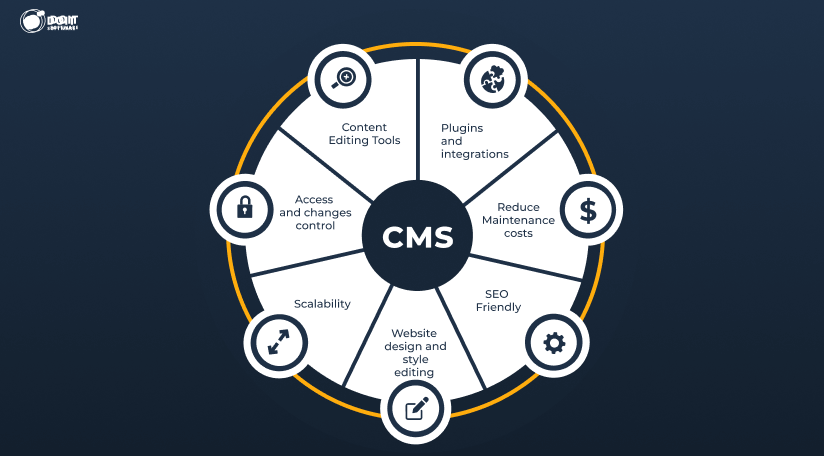
Some companies choose to build a custom CMS to meet the specific needs of their users. CMS serves as a tool to create and update content, for example, blogs, press releases, and even videos. With the usage of additional plugins and libraries, your website can become a powerful way to promote your business. For example, with WordPress media folders, you can organize and manage files; Yoast SEO helps to optimize your website, etc.
Although you can simply use an off-the-shelf solution like WordPress or Magento, going with a custom tool could be beneficial. Regardless of the customizability of modern CMS platforms, a custom-made software solution is much more expandable and even potentially profitable. Especially businesses with new and unique products or services would gain a lot from custom software development, as they can later offer it outside of the company and generate additional income.
CMS software development costs: from $20,000 to $50,000 for a basic platform with design, a few custom features, configuration, and so on.

2006
Shopify is a leading eCommerce CMS focusing on making online selling easy. It features a built-in payment processing and shopping cart system. Also, it has a user-friendly interface and 24/7 support. While it’s powerful for online retail, it’s relatively basic for traditional content management. Shopify is ideal for those who want to set up an online store quickly and efficiently, with pricing plans that cater to various business sizes.
2006

2006
HubSpot CMS Hub is an integrated content management system built on top of HubSpot’s CRM platform. It’s designed for ease of use with a drag-and-drop editor and has built-in SEO tools. Ideal for businesses looking to integrate marketing and CRM infrastructure within a CMS. The platform offers various tiers, starting with a free plan, and is particularly suited for growing businesses and large enterprises.
2006

2003
WordPress is the world’s most popular CMS, powering around 43% of all websites. It offers vast customization capabilities with thousands of themes and plugins. Known for its flexibility, it allows the creation of various websites, from blogs to e-commerce stores. It’s free but requires hosting and domain name, and users are responsible for security and backups.
2003

CRM systems incorporate various tools that help businesses keep track of their customers, win over potential clients, and manage vendor and partner relationships. There are hundreds of CRM systems on the market, from complex to basic and simple. However, companies with unique management approaches or target audiences might benefit from a custom CRM platform. Besides, CRM systems usually come with a scalable pricing structure that makes them quite an investment for a large company. Are you looking for the best CRM software? Creating a bespoke tool, in this case, might not only deliver you a software solution that perfectly suits your needs and requirements but also save you money.
CRM software development costs: on average, $100,000 for a platform with a basic set of features, plus a few tailored functions. However, large and complex CRM solutions like Hubspot, Salesforce, Freshsales, etc. might be up to $600,000+.

1999
Salesforce is recognized for its extensive selection of CRM products and customizability. It caters to various industries with modern sales features, including social media engagement for lead generation. Salesforce also includes AI-powered tools for data analysis and app creation. Additionally, it integrates with many other platforms, such as Quickbooks, MailChimp, Jira, ActiveCampaign, etc.
1999

2022
monday sales CRM is part of the monday.com platform and is known for its project management capabilities. It offers intuitive interfaces, customizable dashboards, and advanced automation features. The CRM is designed for ease of use and is highly adaptable, making it ideal for businesses that require a combination of CRM and project management.
2022

2002
Quickbase provides a flexible, no-code platform that allows businesses to create a CRM system according to their specific requirements. It’s adaptable and includes features like drag-and-drop workflow automation and file attachment space. Quickbase is especially suitable for users with some technical aptitude, offering a customizable CRM experience.
2002
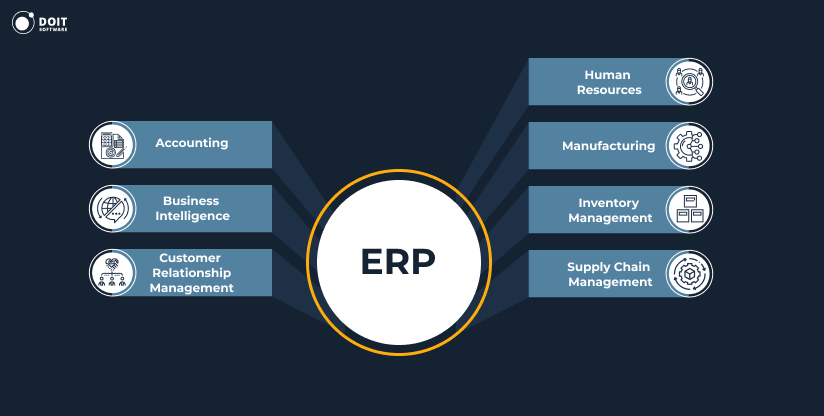
ERP systems are built to help businesses manage their daily operations such as accounting, compliance, supply chain tasks, project management, procurement, etc. A small company can afford to use an off-the-shelf solution, but as businesses grow, the number of daily tasks increases. At the same time, the earlier you invest in a custom ERP solution and start using a system tailored particularly for your business needs, the quicker you will gain the benefits. Having a custom ERP tool at hand is beneficial for any growing business, especially in less saturated industries. A scalable solution tailored to your needs and requirements will definitely cover your back and allow you to focus on the product itself. So, if you’re planning to build one from scratch, you may choose Java, Python or ASP.NET software development, for instance.
ERP software development costs: from $100,000 and more, depending on the number of features and size of the company. The sheer amount of data in large enterprises requires more advanced features for ERP solutions. This way the cost of such solution development can increase to $150,000 – $500,000.

1998
Oracle NetSuite ERP offers a comprehensive suite of cloud-based services and solutions for small, medium, and large organizations across various industries. Its capabilities include financial management, inventory management, HR, analytics, omnichannel commerce, and more. The platform is designed to help organizations grow, scale, and adapt to changes in their industry.
1998

2005
Odoo provides a range of business management applications, including CRM, e-commerce, inventory management, accounting, and more. Thanks to its open-source nature, there are more than 100 thousand developers contributing to creating over 40 thousand community apps. Odoo is known for its flexibility and scalability, making it an accessible option for growing companies.
2005

2015
SAP S/4HANA Cloud enables businesses to conduct real-time analytics and reporting directly on transactional data without needing separate data warehousing or batch processing. This integrated data processing approach means businesses can gain instant visibility into various areas like supply chain, finance, sales, and customer service. The system also supports advanced analytics capabilities, including predictive ones, which can help businesses forecast trends and make proactive decisions.
2015
Even if you’re not ready to build a custom ERP from scratch, it’s worth comparing leading cloud ERP suites. Understanding the benefits of using IFS Cloud can help you see how a modern, cloud-based ERP platform streamlines operations, improves cross-department visibility, and reduces the need for manual work. These insights make it easier to evaluate whether an off-the-shelf solution can support your long-term growth without the cost and complexity of custom development.
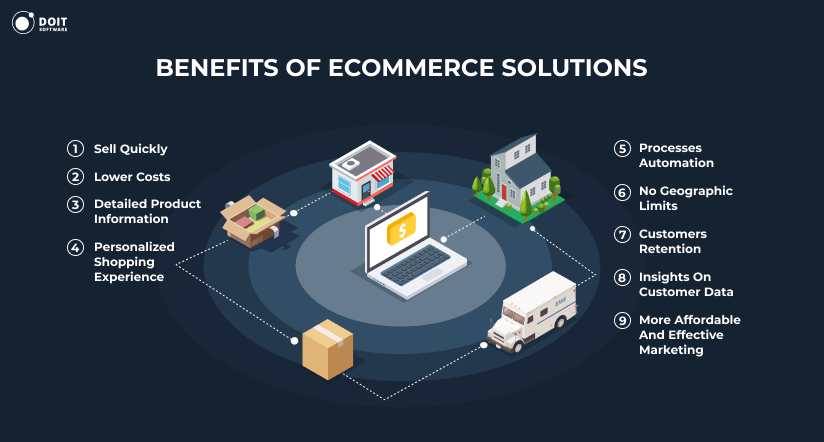
eCommerce software allows businesses to create websites to promote and sell their digital and physical products. Such platforms provide a way to integrate the online store into the business’s website and give users direct access to products and services. Many businesses will find existing eCommerce platforms, like Magento, OpenCart, Shopify, and WooCommerce satisfactory, but some companies require custom software solutions. Especially companies with unique architecture or complex requirements will benefit from the customizability and creative freedom of a custom eCommerce solution.
eCommerce websites built on one of the popular eCommerce CMS, such as Magento, OpenCart, Shopify, and WooCommerce, have development costs: from $20,000 to $70,000 and more. It all depends on the level of customization, needed integrations, etc.
Software development costs for a custom eCommerce system built from scratch: starting from $50,000 for a simple product, and up to hundreds of thousands of dollars for complex solutions, depending on the requirements.
If you’ve decided to work with a ready-to-go solution, WooCommerce consulting companies can help you determine the most cost-effective and efficient way. Running a discovery phase will help you to achieve your custom eCommerce goals, ensuring that your investment aligns perfectly with your business needs.

1994
Amazon started as an online bookstore and rapidly expanded to become one of the world’s largest eCommerce platforms. It offers a vast selection of products, including electronics, apparel, home essentials, and more. Amazon is also known for its customer service, fast shipping (especially with Amazon Prime), personalized recommendations, and easy search functionality.
1994

1995
eBay is a global online marketplace that allows individuals and businesses to buy and sell a wide array of products. Known for its auction-style sales, it’s a popular destination for collectors and those looking for unique or hard-to-find items. eBay also offers “Buy It Now” options and features a robust system for buyer and seller feedback to ensure trust and reliability in transactions.
1995

2009
Sigma Beauty is a beauty brand known for its wide range of quality makeup brushes. Their Shopify-based website showcases a beautiful and responsive design with easy-to-use navigation and product filters. The site integrates with social media platforms and offers personalized product recommendations.
2009
Supply chain management (SCM) is a complex business process that involves many actors, such as suppliers, vendors, retailers, distributors, producers, and customers. The process starts with raw materials and follows them all the way until the end consumer purchases the final product. SCM software is created to optimize and automate supply chain management processes to enhance performance and eventually increase revenue.
SCM software development costs: can start from $100,000 to $300,000 on average, and more for more complex solutions.

2014
LeanDNA is a cloud-based platform providing actionable intelligence to enhance supply chain efficiency. The factory inventory management software offers pre-built supply chain analytics and best-practice operational strategies to optimize resource utilization and reduce excess inventory.
2014

2006
Coupa Procurement is a cloud-based software designed to streamline procurement processes. It provides tools for contract and supplier oversight, inventory control, purchase orders, and requisitions. Key features include efficient payment management, compliance tracking, and e-invoicing capabilities. It’s part of the Coupa Business Spend Management suite, offering integrated solutions for procurement, supply chain, and finance.
2006

Körber, formerly known as HighJump WMS, offers a warehouse management system adaptable to various business practices. It features a full HTML5 user interface for accessibility from any device. It integrates with ERP systems, materials handling equipment, and more, providing flexibility with on-premise or cloud deployment options
SaaS (Solution as a Service) applications are gaining noticeably more attention in the past few years. SaaS-based apps can be used in exchange for a monthly or yearly fee and can be accessed from any device. Usually, these types of apps are hosted in the cloud and provide a great level of security and convenience for end-users. SaaS works for various businesses, and this diversity influences SaaS marketing in effectively targeting and addressing the specific needs of different industries. Thus, it is quite difficult to estimate the average development costs.
SaaS software development costs: from $25,000 to $100,000, and even more for complex SaaS products.

2003
Tableau is a well-known business intelligence platform that simplifies complex data analysis. It’s known for its user-friendly interface and ability to generate customized reports and visualizations. Tableau allows users to share and collaborate on data analytics and integrates with many applications, making it a preferred choice for businesses seeking insights from their data.
2003

2006
Wrike is a versatile project management tool that includes features like task management, Gantt charts, customizable workflows, and integration with various apps like Excel and Salesforce. It’s suitable for a range of business sizes and offers tailored solutions for specific teams, including marketing and enterprise-level needs.
2006

2014
HotJar is a leading tool for conversion rate optimization. It provides insights into how users interact with a website through heatmaps, visitor recordings, conversion funnel reports, and form analysis. This data helps businesses understand user behavior and make informed decisions to improve site performance and UX.
2014
Let’s take a look at concrete numbers based on cases of creating alternatives to the most successful mobile apps. Average software development costs of creating a popular app like Uber or Tinder.
$80,000 – $100,000
$60,000 – $80,000
$80,000 – $100,000
$100,000 – $120,000
$80,000 – $110,000
$150,000 – $300,000
The average software development costs also vary from small and medium businesses to large corporations. In short, we will split all the businesses into three categories: startups, SMEs, and large enterprises. Depending on the company’s size, you will require a corresponding number of features, certain scalability metrics, feature complexity, and other characteristics. Let’s perform a software development cost breakdown and see what you will pay for a small, medium, or large application.
Startups are companies that are just opening their business and launching products, and creating a custom solution right away could be very beneficial. Building a tailored solution that caters to the specific needs of your business and audience will help you avoid reputational losses. Off-the-shelf tools can fail to provide some essential services that your industry requires and repel clients right at the beginning. At the same time, even a small successful application will generate some user base and give the much-needed promotional boost to take your idea to the next level.
Basic app versions are usually called MVPs, Minimum Viable Products. As a startup, you can create a small app with only essential features in just 2 months or 800 hours (total for the whole team of PM, QA, Designer, Back-end, and Mobile developers). The price for such an app will vary depending on the location and the average rates in your region. Still, the software development costs would lie between $30,000 and $45,000.
To take the business to the new level, SMEs are developing custom solutions to automate daily tasks and streamline internal processes. On top of that, a growing business always requires scalable software development for small businesses to meet their needs without compromising security, speed, performance, and other important factors.
An average software development time estimation for a medium-sized app would be around 4-6 months or 2000 hours (total for the whole team, which usually consists of PM, QA, Designer, Back-end, and Mobile developers). If we apply the same average rates ($50 per hour) as in the example above, the average software development costs would be from $70,000 to $100,000.
Big corporations usually perform millions of operations and employ thousands of people. For an internal application, such enterprises definitely require large custom tools to manage their daily tasks. Large corporations face higher security threats as they become a very enticing target for hackers. Custom-made solutions will be specifically tailored to protect your assets and data to ensure that no serious breaches occur. Such software solutions are required to be compliant with data protection laws like GDPR to guarantee smooth operations.
With the same rate of $50 per hour, large-scale apps take more than 6 months to develop and cost over $100,000 or even over $500,000.
In this section, we will concentrate on the five most significant factors that influence the final software development pricing. We have already touched on the topic but focused on the custom software types and the company size. Although both these aspects impact the price tag, there are a few factors that shape the budget even more.
You will not be surprised to hear that the costs of software development lie in direct correlation with app complexity. This aspect involves several matters, such as the number of features, the complexity of features, and the level of customization. Clearly, the more features you would like to add to your product, the higher the price tag gets. But what about complexity? How to calculate the cost to develop software based on complexity?
Let’s take a look at a simple example: for a signup, you can implement a basic email signup feature (20 hours) or add a social media integration that allows users to immediately sign up using their accounts (extra 20 hours). The latter will be more complex and thus more expensive, but it will also be better for the user experience. The number of features and complexity of the future app should be established after the market research during the discovery phase. Without knowing the market and target audience, establishing which features are important will be very difficult and unproductive.
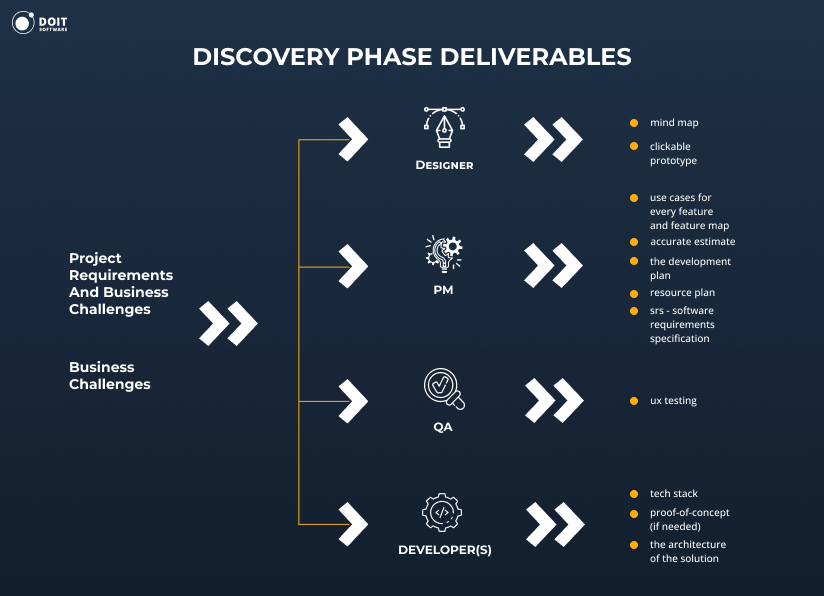
Basically, for a mobile solution, you have two options when it comes to platform choice: native and cross-platform. Without going too much into technical details, native app development delivers you one app for one platform (iOS or Android), whereas the cross-platform approach allows businesses to create an app for two platforms simultaneously, using one source code base.
The catch is that native app development is more expensive, as you will have to write two codebases. However, native apps demonstrate higher speed, better performance, and excellent UX.
The cross-platform development approach is noticeably cheaper. At the same time, the metrics like UX, performance, and page load usually suffer. There are a few tricks of developing cross-platform apps and also preserving high rates in performance and speed. Read about how to decrease the cost of software development with just a few tips.
If you would like to also create a web application, the choice of platform is less important as most web development languages like JavaScript or Python are platform-independent. In other words, you can create a web app that will work no matter what the system is – Windows, Linux, or macOS.
Although it may not sound like the most expensive item on the list, UI/UX design can be quite pricey. Especially nowadays, people have realized the potential of great UX and the wonders it can do for your app.
UI/UX design incorporates everything from buttons, colors, icons, etc., as well as the navigation itself and how easy and pleasant it is to use the application. Nowadays, businesses also strive to be inclusive and make their products accessible for visually and hearing-impaired individuals. The intensity and complexity of UI elements and your designer’s rate drastically affect the software development costs.
Besides the frontend, which entails UI/UX design, you have to take care of the backend for the application. The bigger the app, the more complex processes will be required to operate the functions. For example, behind Uber’s easy-to-use interface and clear navigation, you will discover myriads of hidden processes that connect users to drivers and admins, load and update maps, track the delivery, and send notifications.
Moreover, data protection has become a crucial part of every business. You have to think about data privacy compliance throughout the entire software development process, and ensure that both your and the user data will be safe after the app launch. The challenge to keep compliance and regulatory functions in-house is bigger than ever with regulations being updated on the market almost every day.
For example, are you aware of the CCPA vs CPRA difference? Do you know what’s new in the GDPR regulations and that you have to be GDPR compliant if you have customers in the EU market? If you wish to stay on top of the ever-changing regulations and avoid costly fees and enormous penalties that can break your business, you need a data privacy software system to handle this for you.
Finally, you may need to integrate with other systems to provide your services. This will require purchasing APIs or building custom ones in some cases. In other words, if you build an app that needs a large number of processes and third-party integrations, your backend development costs will rise.
The final and vital aspect of software development cost estimation refers to HR processes. Firstly, your bill will change depending on the team composition, hiring model, and the location of the development company. In this part of the article, we will explore how and why these aspects influence the software development budget and try to find ways to decrease the costs.
A standard software development team for web solutions usually includes frontend and backend developers, for mobile – backend and mobile app developers who write code, and a Quality Assurance (QA) engineer who runs tests. Besides that, development teams employ a UI/UX designer to create user interface elements and make the app aesthetically appealing and easy to use. On top of that, there is a DevOps engineer who takes care of the CI/CD pipeline, a Product Manager who makes sure the product requirements are in place, and a Project Manager who manages both the team and the processes.
If you are building a small application on a tight budget, you will not require a large team of coders and managers. The complexity and scale of the project identify the budget.
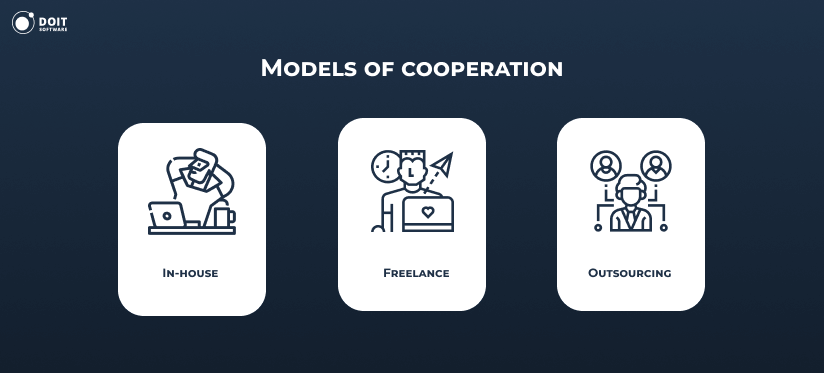
We will describe the three most common hiring models that are prevalent in the tech market. You can employ in-house workers, hire freelancers, or outsource your project to a third-party vendor, choosing the best BPO company. Before you can estimate software development costs, familiarize yourself with different models and choose the one that suits your business.
Freelance software developer rates are usually lower than in-house employee’s salary, but the quality of the project might suffer. On the other hand, freelancing and outsourcing are great for short-term projects, and the in-house model only works for long-term collaborations. What are the benefits and drawbacks of each model?
Costs
Expensive: includes taxes, benefits, hiring costs, office equipment, etc.
Affordable: you can find a freelancer on freelancing platforms like Toptal or Upwork.
Affordable: depending on the pricing model, you will avoid extra charges.
Contract duration
Long-term: in-house workers are usually hired for the long term.
Short-term: freelancers are hired per project.
Both: you can outsource a small task for the short term or hire a dedicated team for a long-term project.
Quality
Good: HR will make sure to vet the candidates and find you the best worker.
Poor: some freelancers may not be very reliable.
Good: an outsourcing company will be contractually obligated to deliver.
Communication
Great: you will communicate via corporate channels.
Poor: as the worker is not a part of your team, a few misunderstandings might arise.
Good: you will be assigned an account manager to handle communication about your project.
Dedication
Great: your in-house employee will be dedicated to performing well.
Poor: short-term freelancers might lack the motivation to perform their best.
Good: reliable outsourcing companies are fully dedicated to your project.
The software development costs are also contingent on the location of the development company. If you decide to outsource, you may manage to lower your software development prices by a large percentage. Take a look at the hourly custom software development rates across different countries:
Now, we’ve covered most of the aspects that determine the budget of your software development. Still, in this part, we want to mention some factors that are less obvious but can significantly influence the final cost. What are those?
DOIT Software is a custom software development company with years of experience and a rich portfolio of successful cases. We believe our extensive knowledge of the development process can help you get an accurate estimate of the software development cost for your project. However, before calculating the possible costs of development, you need to do some homework.
Firstly, describe your idea in detail and the problem your app is going to solve. Based on that, prepare a list of essential and non-functional features you would like to implement. Add a few examples of existing solutions and specify your unique value. Finally, provide technical specifications, design ideas, and some wireframes. To get an accurate estimate for your idea, contact the DOIT Software team.
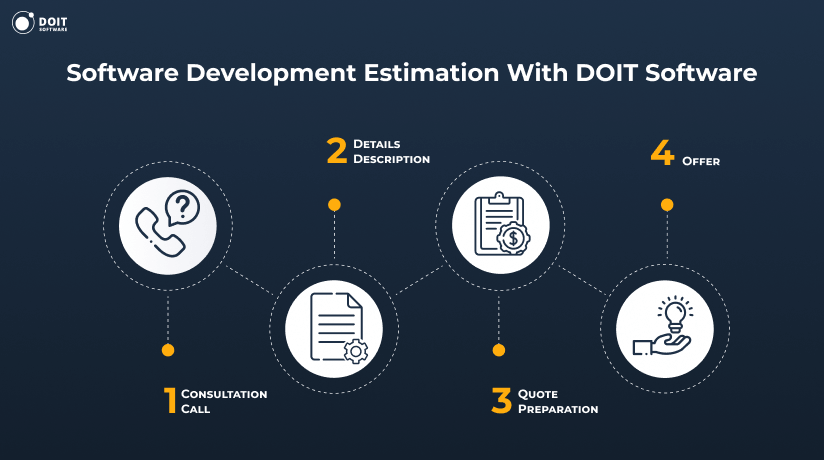
Our team always strives to optimize the workflow and make the communication with clients smooth and friction-free. This is why we have developed 4 steps to a quick and accurate estimation of custom software development costs.

Another essential part of the software development and product design cost estimate is creating a software requirements specification. Software requirements specification (SRS) is a document that contains all the technical information relevant to the project, including product scope, target audience, user needs, functional, non-functional, and system requirements. SRS is a long and detailed document that outlines the framework of the entire software development project.
There are a few methods of custom software development cost estimation that we use at DOIT Software.
There are some software development cost estimation examples that you can find online. However, with the following steps, you can create a template by yourself:
The cost of software engineering is hard to grasp as projects can be quite big and overwhelming. However, without a good estimate, you are bound to overspend and run out of resources. Luckily, there are tech companies that can help you get through this challenging phase and calculate the software development costs for you. Contact DOIT Software and use our extensive knowledge and experience to create an accurate estimation of the development costs for your project.
Transform your idea into a successful product with the DOIT Software team.
Contact usDepending on the project requirements, features, the location of the software development company, and other aspects, software development costs for a small app are from $30,000 to $45,000, for a medium-sized project from $70,000 to $100,000, and for a large-scale complex application, $100,000 and more.
There are a few ways of calculating software development costing, but we can roughly divide them into two categories: ballpark and detailed. Ballpark is a rough estimation you receive to get an idea of how much the app development will cost, whereas a detailed estimate is what follows afterward and calculates the costs more scrupulously.
Software development cost per hour depends on the location of the vendor. Software engineering contract rates tend to be a little lower in Eastern Europe countries such as Ukraine ($35-60), and higher in Western Europe ($60-80) and the US ($80-100).
The most significant factors of software development costs are the app complexity, the number of features, and the location of the software development company.










